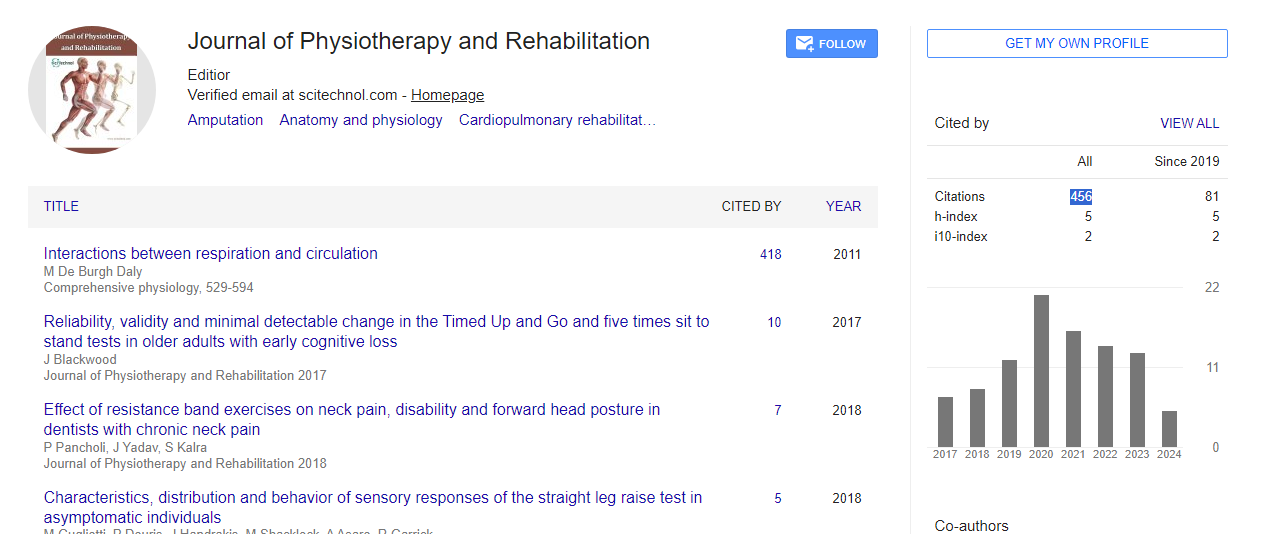Perspective, J Physiother Rehabi Vol: 8 Issue: 1
Cardiopulmonary Rehabilitation A Pathway to Wellness
Reza Degar*
1Department of Physiotherapy, Mashhad University of Medical Sciences, Mashhad, Iran
*Corresponding Author: Reza Degar,
Department of Physiotherapy, Mashhad University of Medical Sciences, Mashhad, Iran
E-mail: Degar@163.ir
Received date: 02 January, 2024, Manuscript No. JPTR-24-134573;
Editor assigned date: 04 January, 2024, PreQC No. JPTR-24-134573 (PQ);
Reviewed date: 18 January, 2024, QC No. JPTR-24-134573;
Revised date: 26 January, 2024, Manuscript No. JPTR-24-134573 (R);
Published date: 02 February, 2024, DOI: 10.4172/JPTR.1000160
Citation: Degar R (2024) Cardiopulmonary Rehabilitation A Pathway to Wellness. J Physiother Rehabi 8:1.
Description
Cardiopulmonary rehabilitation serves as a vital pathway to wellness for individuals with cardiovascular and pulmonary conditions. By integrating exercise training, education, and lifestyle modification, cardiopulmonary rehabilitation programs aim to improve functional capacity, enhance quality of life, and reduce the risk of future complications. In this article, we explore the essential components and benefits of cardiopulmonary rehabilitation as a comprehensive approach to promoting health and well-being.
At the heart of cardiopulmonary rehabilitation lies exercise training, a cornerstone component that targets improvements in cardiovascular and pulmonary function. Supervised exercise sessions, tailored to individual abilities and medical considerations, focus on aerobic conditioning, strength training, and flexibility exercises. These structured workouts not only improve cardiovascular fitness and muscular strength but also enhance endurance, facilitating activities of daily living and promoting independence. Regular exercise has been shown to reduce symptoms, such as dyspnea (shortness of breath) and fatigue, in individuals with chronic conditions like heart disease, Chronic Obstructive Pulmonary Disease (COPD), and pulmonary hypertension.
Education plays a pivotal role in cardiopulmonary rehabilitation, empowering individuals with the knowledge and skills needed to manage their conditions effectively. Educational sessions cover topics such as medication management, symptom recognition, stress management, nutrition counseling, smoking cessation, and risk factor modification. By providing evidence-based information and practical strategies for self-care, education empowers individuals to make informed decisions about their health and adopt healthy lifestyle behaviors. Moreover, education fosters self-efficacy and confidence, enabling individuals to take an active role in managing their conditions and preventing disease progression.
Behavioral counseling is another essential component of cardiopulmonary rehabilitation, addressing psychosocial factors that impact health outcomes and adherence to treatment plans. Behavioral interventions target modifiable risk factors, such as sedentary behavior, unhealthy diet, smoking, and stress, through goal-setting, problem-solving, and motivational interviewing techniques. By addressing barriers to behavior change and promoting positive health behaviors, counseling empowers individuals to adopt sustainable lifestyle modifications that support long-term health and well-being. Additionally, counseling provides emotional support and encouragement, helping individuals cope with the challenges of living with chronic conditions and promoting resilience.
In addition to exercise training, education, and behavioral counseling, cardiopulmonary rehabilitation programs offer comprehensive assessment and individualized care management. Multidisciplinary teams consisting of physicians, nurses, exercise physiologists, dietitians, respiratory therapists, and other healthcare professionals collaborate to address the complex needs of individuals with cardiovascular and pulmonary conditions. Comprehensive assessment includes baseline evaluations of cardiovascular and pulmonary function, exercise tolerance, nutritional status, psychosocial well-being, and functional capacity. Based on these assessments, individualized care plans are developed to address specific needs, goals, and preferences, ensuring personalized and holistic care delivery.
The benefits of cardiopulmonary rehabilitation extend beyond physical health outcomes to encompass psychosocial and quality of life improvements. Research has shown that participation in cardiopulmonary rehabilitation is associated with reduced hospitalizations, improved symptom management, enhanced exercise tolerance, increased functional capacity, and better health-related quality of life. Moreover, cardiopulmonary rehabilitation has been shown to reduce mortality and morbidity rates in individuals with cardiovascular and pulmonary conditions, making it a cost-effective intervention for improving long-term health outcomes.
Conclusion
As we navigate the challenges posed by cardiovascular and pulmonary diseases, cardiopulmonary rehabilitation serves as a beacon of hope, offering a pathway to wellness and improved quality of life. By integrating exercise training, education, behavioral counseling, and comprehensive care management, cardiopulmonary rehabilitation empowers individuals to take control of their health and well-being. As advocates for preventive care and simple health promotion, we must continue to prioritize the expansion and accessibility of cardiopulmonary rehabilitation programs, ensuring that all individuals have the opportunity to achieve optimal health and wellness.
 Spanish
Spanish  Chinese
Chinese  Russian
Russian  German
German  French
French  Japanese
Japanese  Portuguese
Portuguese  Hindi
Hindi 